A Bed of Thorns: For the migrant cotton carders from Bihar, their work in West Bengal earns them just disease and despair
The Mansoori community, traditionally associated with cotton, either in its cultivation, ginning or trading, sees no future for its craft with a decline in demand for cotton mattresses, and the impact of COVID-19. Many of its members suffer from asthma and tuberculosis.


The Mansoori community of Bihar struggles for survival while it battles diseases and the pandemic. Pic: Srishti Lakhotia
At the Bandhaghat cotton market near Kolkata in West Bengal, the twanging sounds of the jantar, an instrument used by the karigars to fluff cotton, greet the visitor. A narrow gully, strewn with cardboard packaging and discarded placards, leads to a godown that is about 1,000 square feet, dark with cemented walls looking ghostly as they are covered in wisps of cotton wool. Even the grills that let in some light and air are shrouded in it.
There are mounds of cotton on the grey floor, around which 40 men, in their lungis, sit there with their nose and mouth covered as they beat the cotton. These are the cotton carders belonging to the Mansoori community, better known as dhunias, who regularly migrate from various districts in Bihar to Bandhaghat in West Bengal, to clean, sort and stuff cotton into mattresses, quilts and pillows. The godown acts as a commonplace of work for the karigars and shop keepers. Previously, it used to be a bamboo structure with tin slabs for shade, but now it is a pucca building.
Many Mansooris from Bihar have been earning their livelihood in West Bengal at Bandhaghat in its century-old cotton market for generations. Some also live and work in Cotton Street in Kolkata, beating and fluffing and stuffing cotton.
The migrant Mansoori community has been hit hard by the novel coronavirus disease (COVID-19) pandemic, as they lost their livelihood, returned to their villages, only to find no work back home. These migrant cotton carders from Bihar are now returning to Kolkata and its neighbourhoods in search of work.
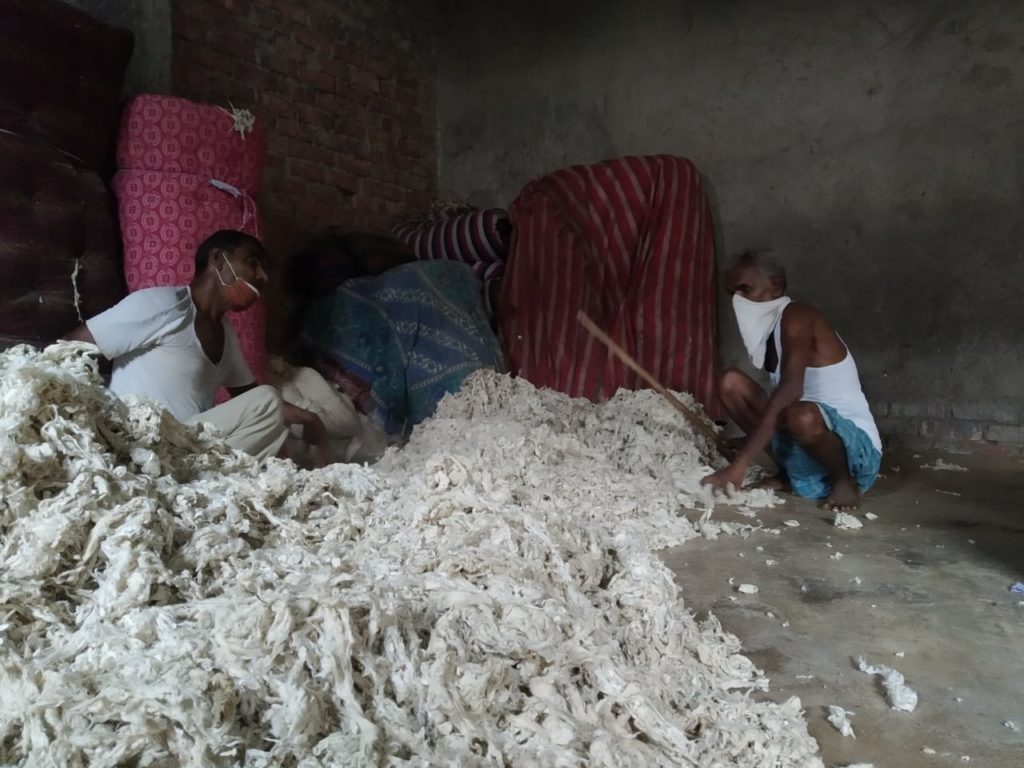
Not much of a homecoming
“The name ‘dhunia’ as mentioned under the Other Backward Class list in the Constitution, was set by our great-grandfathers. We come from the line of Sheikh Mansoor, a Sufi saint, and Mansoori is what we would like to be called. But most people call us ‘dhunia’,” explained Mohammad Islam who hails from Vaishali district in Bihar, but works in Bandhaghat.
The Mansooris, who came originally from parts of Perisa and Afghanistan are now found scattered in Bihar, Madhya Pradesh, Uttar Pradesh, Gujarat and Rajasthan. They have traditionally been occupied in the business of cotton, either in its cultivation, ginning or trading.
Three months ago, hit hard by the COVID-19 pandemic and with nothing to hold them back in Bengal, many of these Mansoori karigars returned to their villages in Bihar. From March to June, when it is usually a busy time for mattress-making, the market was closed this year, and there was almost no income for them.
Mohammad Akhtar, who works at Bandhaghat, spent Rs 2,500, he could ill afford, rented a vehicle along with seven others including his older brother, Razak, and went back home to Samastipur in Bihar, where for some time they worked on a small patch of land that belonged to their maternal grandfather, but that was not enough to support them.
“This year, due to the floods we suffered a loss and though we were supposed to get six thousand rupees from the government of Bihar, as compensation for crop damage, we got nothing,” Akhtar told Gaon Connection. So the brothers returned to Bandhaghat to resume work as cotton carders. “We have travelled back five hundred forty five kilometres in order to start working again,” Akhtar, informed Gaon Connection.
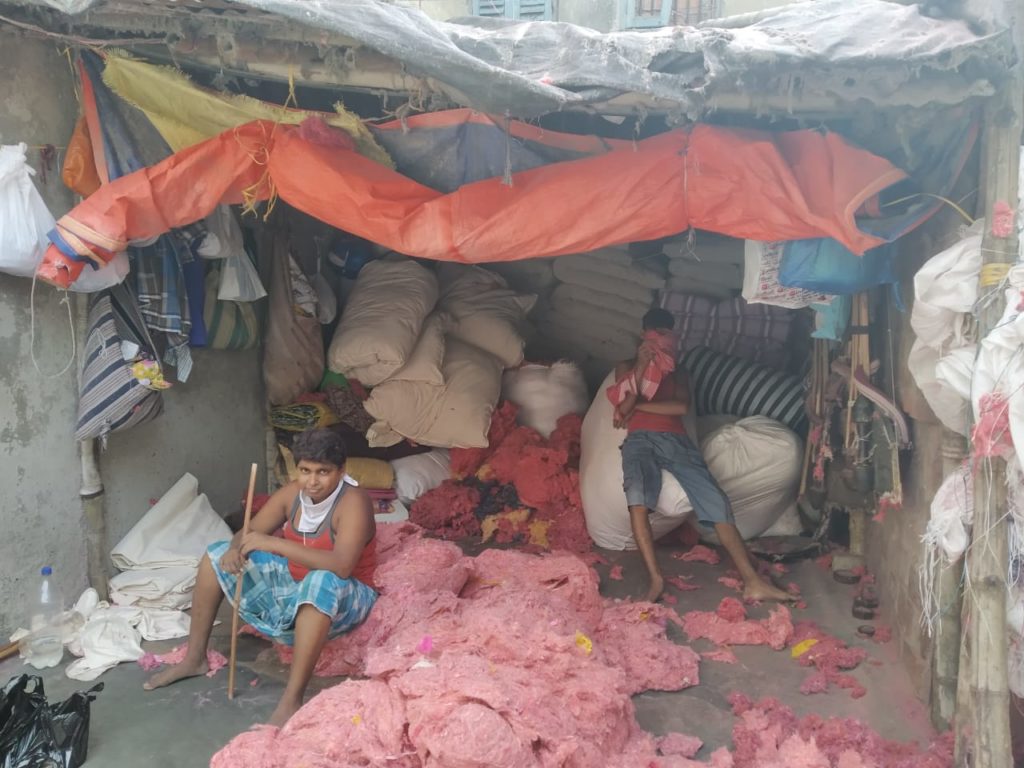
Around the same time Akhtar and Razak went back to their village, Mohammad Anwar who works at Cotton Street Kolkata, also decided to get back home to Begusarai district, Bihar, in time for Ramzan. He managed to obtain a pass from the Lalbazar Police Station in Kolkata and boarded a matador to make that seven-hour journey to his village. “The world’s in a financial crisis with no jobs. What would we eat or drink? So we decided it was better to go back home. At least there, we could borrow and eat something in the village. Who will do that for us here in the city,” said Anwar.
But like Akhtar and Razak, his stay at Begusaria was short lived as there was no work or wage back home to keep him there. “There is no value for labour,” lamented 38-year-old Anwar, who was forced to come back to the city to earn a living.
Akhtar and Razak learnt cotton-carding or dhunai from their father. Akhtar was only 10-years-old when his father taught him the craft. His older brother started work in Bandhaghat in 1972, and still works there, at the godown. “Most of us here are related. Some are uncles, brothers or neighbours. We don’t have any unions here. We just tend to stay in groups and look out for each other because no one else will. If we had a union, we would not have been stuck here,” pointed out Akhtar to Gaon Connection.
During the lockdown, roughly half of the cotton carders stayed back at Bandhaghat, living in their rooms near the Bandhaghat Masjid. “Back home, I didn’t have land to plough nor any other work. At least here I could do menial jobs,” Mohammad Islam who remained behind, told Gaon Connection. Islam recalled how his father taught him dhunai under the harsh sun back home at Samastipur in Bihar, and it took him six years to learn the craft.
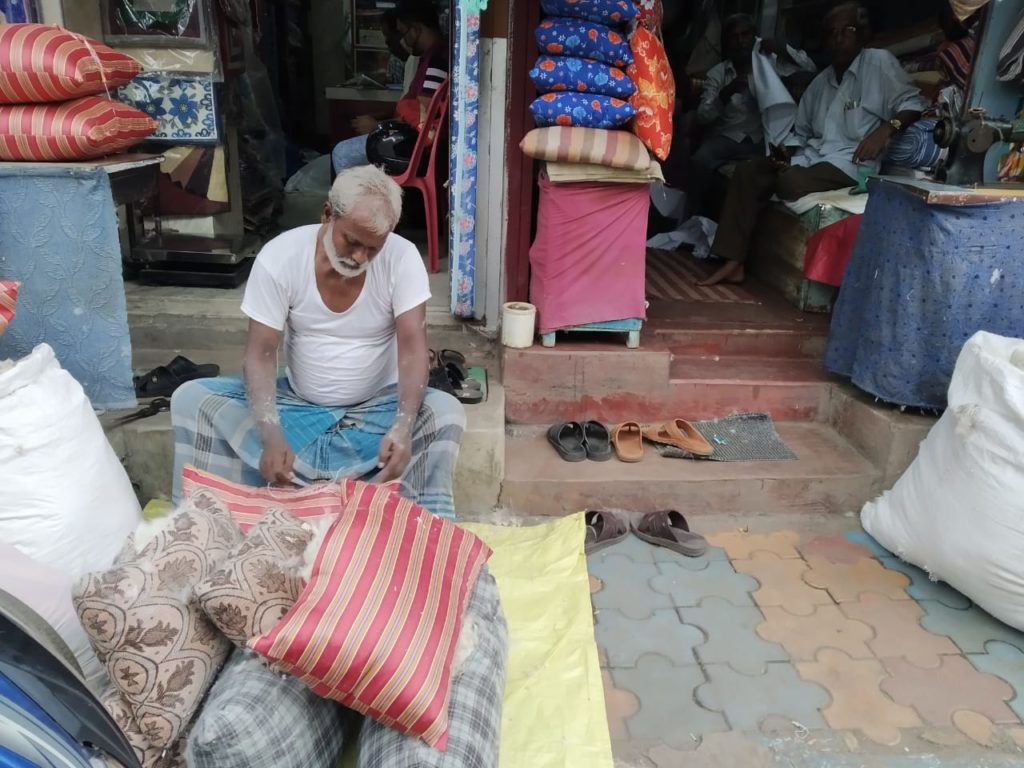
Recently, Gaon Connection released findings of the first ever national survey carried out in 179 districts across 20 states and three union territories on the impact of COVID-19 on rural India. It found that almost 80 per cent rural residents did not get work under the MGNREGA (Mahatma Gandhi National Rural Employment Guarantee Act, 2005). In Bihar, only 13 per cent households got work under the Central scheme.
Further, while stranded in the cities, many migrant workers had to go hungry. In the Gaon Connection Rural Survey, 13 per cent of the respondents said they had frequently gone hungry the whole day while they remained in the city during the lockdown. Twenty-three per cent of the respondents said they sometimes went hungry for the entire day.
Losing sleep
While the karigars are back to the Bandhaghat cotton market, the work does not ensure them a steady source of income, complain the karigars. It all depends on the sale of mattresses. Some days it could be Rs 400 they earn as labour for a 40-kilogram cotton mattress, on other days they get nothing at all as there is no work.
In the meanwhile, the shopkeepers selling these mattresses and pillows are also in trouble. “We suffered a loss of at least twelve lakh rupees during the lockdown,” Tapan Shreemani, a shop owner in Cotton Street told Gaon Connection.
While Bandhaghat caters to a few customers who still come here to get their old mattresses and pillows refurbished, it also sends finished products to other places in West Bengal such as Asansol, Burdawan, Pandua, Diamond Harbour, and Krishna Nagar. The cotton they deal with comes from Coimbatore and Chennai in Tamil Nadu, and Mumbai in Maharashtra.
“There has been a general decline in business in the last ten years,” admitted Prasanto Dutta who owns the 95-year-old Gandhi Sowry Stores in Bandhaghat along with his brother Sukanto Dutta. “With foam mattress and other synthetic material coming into the market, there are not too many takers for the cotton mattress,” he told Gaon Connection. But, he hopes that like it has been with everything else, old-fashioned traditions will make a comeback and with it a demand for their cotton bedding.
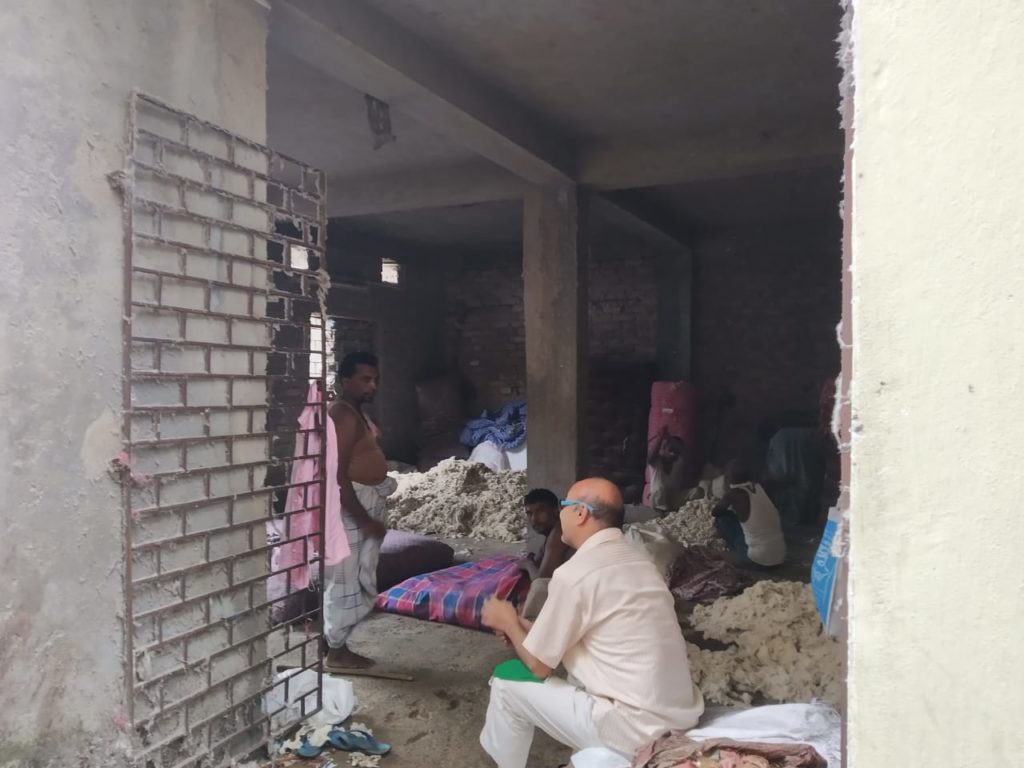
Of dust and disease
But, Akhtar, Anwar, Islam and their co-workers aren’t hopeful. Perhaps they are the last of the Mansooris in this trade. If not the decreasing demand for cotton-filled mattresses and pillows, diseases, such as asthma and tuberculosis, which the Mansooris pick up while making cotton mattresses, is killing them slowly.
“It is a dirty job. Do you see this dust flying out of cotton when it is beaten? This dust gets collected in our throat which causes tuberculosis and asthma. And we do not have the money to get ourselves treated,” Islam told Gaon Connection. “My father died after working 40 years as a cotton carder, due to tuberculosis,” the 45-year-old added, his hands moving non stop on the jantar that fluffs the cotton.
The lint-covered workers said almost everyone had someone in the family who had died of tuberculosis. They pointed to the cobwebs hanging everywhere, saying the cotton dust hung about their lungs and throat in a similar fashion. “That is what happens when you cross a certain age and have spent years in the room beating cotton,” said Islam.
The dust from the cotton leads to breathlessness and dry cough. The karigars eat jaggery and banana to help the dust to pass and not irritate or block their throat. And if the coughing increases then they drink hot milk that helps, but only temporarily, they said.
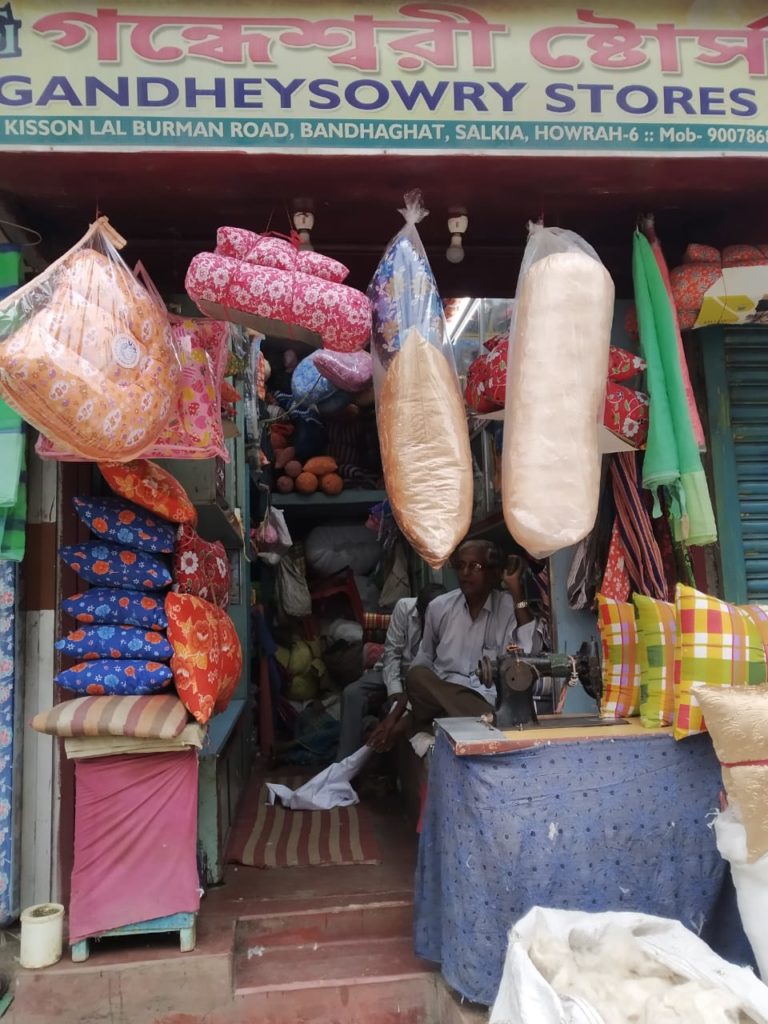
“Our boys will not enter this line of occupation. They will take another. This work has lots of dust with no benefit,” said Islam. “Very few of the next generation will continue in this profession. They prefer to work in the marble business, clothes or even selling balloons in the village. Those are cleaner jobs,” agreed Akhtar.
Over the years, the number of karigars working in Bandhaghat and Cotton Street has declined. While there was a drop from 750 to 100 in Cotton Street that sees a floating population of karigars, at Bandhaghat, where the karigars have been working for longer durations, the drop has been from 200 to 40. This has happened over the last 10 years.
Many of these karigars of Mansoori community are now coolies or cart pullers.

